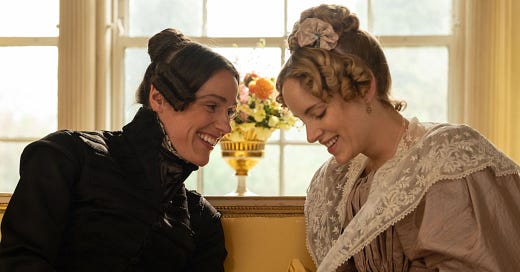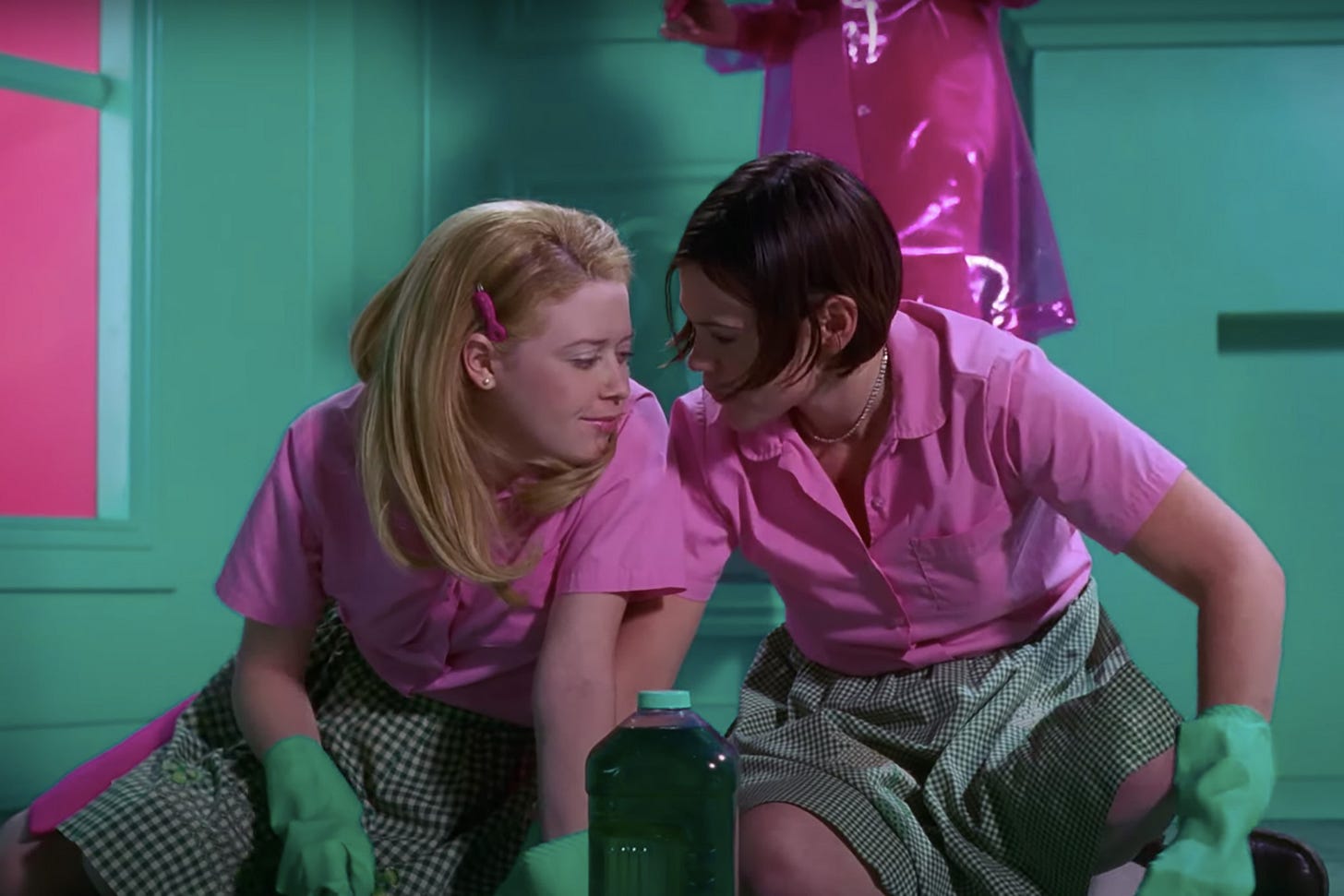What’s wrong with lesbian representation on TV?
What I liked, what I hated, and why I think we shouldn’t look to Hollywood to make us feel included.
Dear lesbian reader,
Have you ever been frustrated, out of your mind raging at the tv, because a movie or series you watched with “lesbians” in it was the most disappointing thing you’ve ever watched? I feel you.
As a baby lesbian, when I first came out, I tried to find scraps of representation in media that could even remotely resemble what a real lesbian experience was like, only to be slapped in the face with negative stereotype after negative stereotype, and straight-up homophobic and misogynistic nonsense. From the straight-looking gals played by straight actresses and the absurd male-gaze, pornified performances, to the “lesbian who suddenly realizes she is not actually a lesbian and has been missing out on men the whole time” trope, as well as the modern-day trope of “transing away the gay” and all the the unnecessary deaths and abuses of lesbian characters on TV… it’s been exhausting. Even back then, I didn’t need a lot of experience to know that hardly any media I consumed with supposed “lesbians” was showing any kind of accurate depiction of the lesbian experience or of lesbian relationships.
As the years passed, and lesbians became supposedly more accepted within mainstream media, I continued browsing, hoping to find something decent to watch on a Tuesday evening, but the results have been consistent: it’s clear they never meant to be about or for actual lesbians.
This said, there have been a few shows and movies, here and there, that have given lesbians a glimpse of breadcrumbs of representation — from more mainstream productions such as Orange is The New Black, The L Word, A League of Their Own, allow me to tell you about the movies and series I personally liked and those I dreaded.
TV SHOWS
My least favorite series with “lesbians” in it ever is undoubtedly the show Feel Good. It features a chronically insecure, gender-confused androgynous woman, who is a struggling comedian with a drug addict past, Mae. She begins to date this repressed straight-bisexual woman, and the series follows both the main character’s struggles and their troubled relationship. Mae — whom by the way, is also not a lesbian — is crippled by mental instability, feelings of inadequacy and pathological attention-seeking. She is also clearly put into comparison with men by her girlfriend, who’s never been with a woman before. Instead of having a nice resolution for this, she concludes that, because she has such distress with her sexed body and its expectations, she must be really not a woman! Because fuck self-acceptance, am I right? Not only was this series a massive waste of my time, but I was fuming, rolling my eyes throughout it, and found it extremely harmful for young lesbians — baited with the pretense of it being a positive lesbian story, it ended up being nothing more than gender/queer/sexual fluidity propaganda.
My favorite series, the one and only which trumps all for me, Gentleman Jack, I trust needs no introduction. It would take me forever to accurately describe how positively impactful this series was to me, personally, and lesbians worldwide. It’s wonderfully made, following the plot of the diaries of real-life lesbian diarist Anne Lister — a 19th century UK landowner whom wanted to find a wife. Not only was this one of the rare “butch” representations on tv, but also a butch and femme relationship. Anne Lister, with her confident gait and kick in her step, strolls over to neighboring heiress Ann Walker every day, trying to woo her and succeeding in doing so. The two quickly form a relationship and their lives become enmeshed together — in true lesbian style. But it isn’t called a period drama without a reason: throughout the series, Anne is tormented by her exes, and Ann suffers from declining mental health. It all ends well, more or less, but I won’t spoil it if you haven’t seen it (why haven’t you?).
This was the only series which made me and my relationship feel seen — perhaps because it was based on two lesbians whom existed in real life, and it’s hard, I suppose, to fuck up and distort actual events. I found this show to be a breath of fresh air after swimming in a sea of bullshit — pardon my french.
MOVIES
My least favorite movie with “lesbians” in it? Simple, The Kids Are All Right. When brought up amongst lesbians, it’s always met with the same visceral reaction of utter disgust. This movie starts with a same-sex couple who had two children by sperm donor. When the kids are old enough, they decide to meet their biological father, whom slithers into their lives like a poisonous snake. The man is always around, and suddenly, one of the two women engages in a sexual relationship with him, acting as if a “real man” was what she’d been missing her whole life. When her partner finds out, she is rightfully revolted, asks why she’s “suddenly turned straight”, to which the cheating one yells something down the line of “you never pay attention to me”, essentially blaming her partner for her own betrayal. Watching this movie made me so angry for a number of reasons. Perhaps it's cause it’s quite mainstream, with well-known actors, and in such context they managed to vilify and brutalize what a sane healthy lesbian relationship could look like, by making it a male-centered propaganda of “lesbians don’t actually exist and actually, they can be converted by the right man”. It was an utter caricature of a lesbian relationships, of non-traditional families and an overall homophobic shit show.
My favorite movie is a cult classic, which I trust also needs little introduction: But I’m a Cheerleader. It follows a high school girl, Megan, who is clearly a lesbian and in denial about it, though everyone around her seems to be aware of it. Family and friends gather for an intervention, revealing she will be sent to a homosexual conversion therapy camp: it sounds depressing, but it really isn’t. In the camp, there are both gay men and lesbians, grouped by sex and color: boys in blue, girls in pink. Throughout the movie, they all have to learn to behave according to the gendered stereotypes assigned to their sex — and because the movie makes such an excellent joke of how ridiculous they are — of course, all of them fail miserably.
The main character engages in a relationship with another lesbian, named Graham, and they have secret getaways to a gay bar in town. It’s not only packed with jokes, escapades, funny moments and ridicule of gendered and sexuality expectations, but it also has an happy ending. I miss when we all used to agree that homosexuality was fixed and unchangeable and that gender roles were ridiculous.
The thing is, none but lesbians know what it’s like to be a lesbian. Male directors will never be able to accurately represent us, and in fact, it’s not in their interest to. Most of the mainstream media is not made by lesbians, and if it is, it is sanitized by corporate production teams, because it must appeal to a wider audience. Why? We can argue lesbians are a small audience. True, but that’s not the real reason why: lesbians who like something will consume it over and over again. It’s because, ultimately, actual lesbians are not really appealing to a straight audience. Can you imagine them sitting through watching a scene of a lesbian bar with us “big scary predatory butches”? They’d be clutching their pearls all the way through. This type of media has been clearly aimed at misrepresentation, inaccuracy, hate propaganda, and showing young lesbian girls that, actually, being a lesbian is a miserable experience one should never go through. Filmmakers know what brings them money: they bait lesbian audiences with the pretense that they will be represented, but they continue to reinforce, over and over, the belief that lesbians are not real and it’s impossible for a woman to be solely and exclusively attracted to women and never date men, allowing them to also profit from a straight audience. In the wider queer and LGBT+ media, we see a similar pattern: everyone is in there but lesbians. Not only is it mainly focused on men and male-attracted women, but everything is fluid, and, if homosexual female characters are ever present, it must be at the condition that they reject both femaleness and homosexuality.
Ultimately, I believe lesbians should stop looking to Hollywood altogether for representation: we will never get it. Lesbians have never been mainstream, and we will never be. We shouldn’t have to be.
Instead, let’s take matters into our own hands. I, for instance, much enjoyed small productions by lesbians, with 90s movies such as Go Fish and The Watermelon Woman — as much as we can all agree they are not your typical, “every-day tv”, you can tell they are made for lesbians. I want to see more of these, as well as documentaries on lesbians lives and loves; about lesbian communities; books with solely lesbian characters and more essays about our unique experiences.
Let’s show young lesbians what lesbian life is really like, what our experiences are like. Younger lesbians deserve to know that it is possible to have a healthy, long-term lesbian relationship without males and male-attracted-centered women ever being involved. Let’s show what exclusive same sex attraction between two women looks like, that we don’t have to be stereotypically feminine in order to be acceptable, and that it’s okay to be gender-non-conforming and wear it proudly on our sleeves.
Sometimes, you have to model and be the change you want to see in the world.
- The Critical Butch






Anyways thank you for mentioning ‘Feel Good’ too, I also totally loathe it! It infuriates me how Mae just wallows in her neurosis and sticks around with this woman who is so shitty to her.
It sucks to finally watch a show featuring a woman that you look like and it turns out she’s her own worst enemy the whole time.
It’s also such a depressing message for the gender non-conforming lesbians who relate to her because her character encourages the idea that being gnc = being totally insecure and dysphoric. Instead of showing girls that are non-conventional as confident and resilient.
The 1995 “The Incredibly True Adventure of Two Girls In Love” is one of the few lesbian (coming of age) movies I actually recommend. It’s got a similar tongue-in-cheek vibe as “But I’m a Cheerleader”. AND it has cute ending. It’s also on Netflix right now!